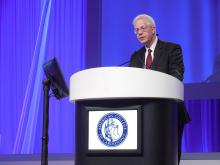The impact of lipid-lowering drugs on patients’ mental states was on the minds of many attendees at the American College of Cardiology’s annual meeting in March.
The highest-profile report came from EBBINGHAUS (Evaluating PCSK9 Binding Antibody Influence on Cognitive Health in High Cardiovascular Risk Subjects), a substudy of the FOURIER (Further Cardiovascular Outcomes Research With PCSK9 Inhibition in Subjects With Elevated Risk) trial, the meeting’s blockbuster. For the first time, it proved that profoundly lowering low density lipoprotein cholesterol with the proprotein convertase subtilisin/kexin type 9 (PCSK9) inhibitor evolocumab led to a significant reduction in adverse clinical events. EBBINGHAUS focused on about 2,000 of the 27,000 FOURIER patients and subjected equal numbers of placebo and evolocumab patients to a battery of cognitive and memory tests over a median of 20 months. The results showed no hint of a decrement in brain function in the patients taking evolocumab, compared with either their baseline state or the controls who received placebo.
The reason why the researchers who designed FOURIER also ran EBBINGHAUS was that statins, the established lipid-lowering drugs, have received a bad rap, with alleged memory and cognitive side effects. As I reported in my news story on EBBINGHAUS, such clinicians as Sandra J. Lewis, MD, were concerned that patients were claiming that statins “make them dumb” on an almost daily basis. That’s a perception that she and others at the meeting attributed to Internet posts about statins that are filled with pseudoscience and horror tales. “We need your help to combat Dr. Google, who has a lot of statin misinformation,” pleaded Robert P. Giugliano, MD, lead investigator of EBBINGHAUS, during a press conference for his study.That perception wasn’t helped when, in 2012, the Food and Drug Administration required the labels of all statins to include a reference to postmarketing reports of cognitive side effects such as memory impairment and confusion. The current label for one statin says: “There have been rare postmarketing reports of cognitive impairment (e.g., memory loss, forgetfulness, amnesia, memory impairment, confusion) associated with statin use. These cognitive issues have been reported for all statins.”
When the FDA issued its requirement in 2012, the rationale it presented could be objectively judged as modest at best. The agency said that “postmarketing adverse event reports generally described individuals over the age of 50 years who experienced notable, but ill-defined, memory loss or impairment that was reversible upon discontinuation of statin therapy. Time to onset of the event was highly variable, ranging from 1 day to years after statin exposure. The cases did not appear to be associated with fixed or progressive dementia, such as Alzheimer’s disease. The review did not reveal an association between the adverse event and the specific statin, the age of the individual, the statin dose, or concomitant medication use.” The FDA statement on the evidence behind its move added that “data from the observational studies and clinical trials did not suggest that cognitive changes associated with statin use are common or lead to clinically significant cognitive decline.”Following the FDA’s action, a series of analyses appeared that reviewed the evidence and found nothing to substantiate the concern. For example, a 2012 review done in direct response to the FDA labeling change looked at case reports, observational studies, and randomized trials and found “no convincing evidence for change in cognitive function” with statin use (J Am Coll Cardiol. 2012 Sept 4;60[10]:875-81). A 2015 meta-analysis that reviewed 14 studies with cognitive testing on more than 27,000 people randomized to either a statin or placebo also found no evidence for a statin effect on mental function (J Gen Intern Med. 2015 March;30[3]:348-58). “Given these results, it is questionable whether the FDA class warning about potential cognitive adverse effects of statins is still warranted,” the meta-analysis authors concluded.
Despite this, concerns about the impact of statins on cognition and memory linger for many patients, witness the anecdotal experiences of clinicians at the meeting. This led a team of researchers at the University of Connecticut and Hartford Hospital to try to directly address the controversy. They also reported their findings at the ACC meeting.
They ran their study as part of a larger trial, STOMP (Effect of Statins on Skeletal Muscle Function and Performance), which randomized 420 healthy and statin-naive individuals to 6 months of treatment with 80 mg atorvastatin or placebo (Circulation. 2013 Jan 2;127[1]:96-103). Their memory substudy included 66 people from the atorvastatin group and 84 placebo-treated controls who averaged 49 years old. Participants underwent a battery of eight memory, cognitive, attention, and executive function tests after 6 months on treatment and again 2 months after statin treatment stopped.
“We saw what many other [statin] studies saw: minimal effects in both groups,” reported Beth A. Taylor, PhD, director of exercise physiology research at Hartford (Conn.) Hospital at the meeting. The linchpin of the test battery was the Cognitive Failures Questionnaire. “No matter how we looked at the results [from this test] we saw no differences between the atorvastatin and placebo groups for cognitive failures,” Dr. Taylor said.She and her associates took testing a step further and used an assessment never before applied to people taking statins. They ran functional MRIs on a subgroup of the participants while they took two additional memory tests at the end of 6 months on atorvastatin and again 2 months after atorvastatin stopped. They ran MRI scans during a figural memory task test on 42 placebo participants and 35 atorvastatin patients and during a Sternberg Task to test short-term memory on 68 people from the placebo group and 52 who received atorvastatin.
The functional MRI results showed some small but statistically significant changes during both tests in patterns of regional neural activation among those in the statin groups while on and off statins and also when compared with those who received placebo, but Dr. Taylor stressed that her group saw MRI differences between the statin and placebo subjects not only when people were on atorvastatin but also when they had been off the drug for 2 months. She also cautioned that “the clinical implications of the findings are unclear.”
Overall, the entire study’s results showed “no convincing evidence of measurable verbal or nonverbal memory dysfunction” linked with statin use, but Dr. Taylor also noted that the study was relatively small.
Speaking as a discussant, Neil J. Stone, MD, who thoroughly reviewed the statin literature as chair of the American College of Cardiology/American Heart Association panel that issued the most recent U.S. guidelines for cholesterol treatment to reduce cardiovascular disease risk, noted that Dr. Taylor’s findings agreed with what his panel found: No signal exists for an effect of statin on cognition and memory. He also highlighted the challenge of looking for cognitive and memory effects that might be caused by statins in older people who already might have age-related memory problems or may have memory or cognitive impairments triggered by other drugs. “There are a lot of variables, with possible neurogenic causes, systemic causes, and exogenous causes of memory and cognitive changes,” Dr. Stone said.Proving the absence of a problem is always difficult. Adding Dr. Taylor’s new evidence to the case that statins really are safe when it comes to cognition and memory will undoubtedly fail to convince committed skeptics.
On Twitter @mitchelzoler





